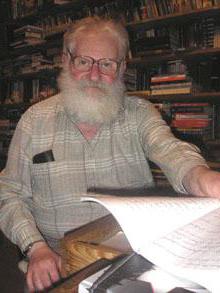Vladimir Borisovich Mikushevich in 2016 on July 5 celebrated his eightieth birthday. This is a Russian poet, prose writer, translator from German, English, French, Spanish and Italian, an Orthodox mystic and theologian, and a religious thinker.
Biography
The biography of Vladimir Borisovich Mikushevich began on his birthday - in 1936, on July 5.
A writer was born in Moscow. His parents: mother - Nina Nikolaevna, and father - Boris Markovich - were economic engineers. In 1960, Vladimir received a diploma from the Moscow Institute of Foreign Languages. He has been translating since the age of thirteen. German culture is considered especially close to itself, which is especially found in translations and non-standard poetic texts in German.

Teaches and educates young people at the Institute of Literature, Literary Creativity and Journalism, lectures at the Moscow Architectural Institute, Moscow Engineering Physics Institute. He heads the poetry translation studio at the Institute of Literary Creativity and Journalism, and constantly contacts readers in Moscow libraries and museums. Monarchy is considered the best model of political governance for Russia. He spoke more than once about the falsity of the current literary activity in Russia; he relates the established procedure for literary awards to the mechanisms of ideological and family support of "his own".
Classical translations of Mikushevich have been familiar to admirers since 1970, the first poetic book by Mikushevich Vladimir Borisovich was published in 1989, since under communist censorship it was not impossible to release it. He is a member of the Union of Writers of Russia. He lives in Moscow and Malakhovka. He was awarded the Prize of the Prince of Anhalt, Duke of Saxony for the popularization of German culture in Russia.
Creation
Mikushevich’s creative work absorbed the beauty and artistry of the Frenchmen of the Belle Epoque period, the Silver Age, the Germans Rilke and Stefan Gheorghe, popular spiritual poems and poetry of all-Russian learned monasticism. Mikushevich’s worldview is expressed in Eliot’s words “repair of old ships”. For pan-Christian culture, in Mikushevich’s view, there is no other way if there is a desire to live, and not to commit group suicide.
Poetic collections
- The Baptism of Dawn: Poems and Poem, 1989
- "Sonnets to the Blessed Virgin", edition 1997, 1999, 2006.
- "The bead." Poems, 2003
- "Sonnets to Tatyana", 2008
Novels
- Mosaic novel, 2002 - "The Future Year."
- Roman, 2005 - "Sunday in the Third Rome."
- 2012 - "This is hell. New Investigations by Elder Averyan."
Essay
- Glimpses. Tallinn, 1997.
- "Power and law." Tallinn, 1998
- Pazori, 2 books, 2007.
Translations
Mikushevich translated the works of such writers as Villon, Chretien de Trois, Petrarch, Novalis, Jonathan Swift, Hoffmann, Eichendorf, Rimbaud, Hölderlin, N. Sachs, Rilke, Grigor Narekatsi, G. Benn, S. Gyada.
Culture spreader
Mikushevich teaches at the Institutes of Literature, Literary Creativity and Journalism, at the Moscow Architectural Institute, Moscow Engineering Physics Institute lectures. He heads the studio of poetic translation.
Moscow residents listen to his lectures on the history of religions, philosophy of language, secret teachings, literature at the Institute of Journalism.
Mikushevich can be seen on TV in the program "Observer". The gathered guests in the studio are always fascinated by the naturalness of an extraordinary, very talented person, rich in spirit, for whom poetry is valued above all else. As a translator, I didn’t translate by interlinear, he makes a translation at a high spiritual level, he is a mediator, recalling what he experienced himself, and translating the writers' works into a language accessible to the people.
On the birthday of Mikushevich, a book of poetry was published, translated by Vladimir Borisovich, a German author Rainer Maria Rilke. Rilke Mikushevich worked on the translation of poetry for half a century.
"Sunday in the Third Rome"
Roman Mikushevich Vladimir Borisovich "Sunday in the Third Rome" describes the work and days of the interlocutor of Rasputin and Stalin, the religious philosopher Platon Demyanovich Chudotorevtseva, following the legacy of German works - spiritual biographies, the Hessian "Bead Game" or Mann's "Doctor Faustus". The latter - in particular, since the name of the narrator is Favstov, and the German doctor himself, who signed the contract with blood, is repeatedly affected in the work.
However, the “gloomy German genius”, which Vladimir Borisovich Mikushevich translated for a long time and effectively, quite intricately echoes in the work with the subtitle “novel-tradition”, but looks like a novel-lecture, which in some places develops into moralizing.
Sets out Vladimir Borisovich Mikushevich through the character’s mouth is truly striking ideas. In a word, the troubles of Russia are due to the replacement of the legitimate sovereigns-Rurikovich "false" Romanovs. Subjects - because they are not "real blood", Sang Ral. The Rurikovichs are real, since the Knights guarding the Grail sent the Viking Rurik to Russia.
At the same time, the Albigens communists are affected, it is proved that the death of Rasputin is a symbolic enrichment of the Russian revolution. In addition, in the work of quite stunning spiritual and verbal games.
Vladimir Borisovich Mikushevich as strict, deep, old-fashioned novelist: his work is beautiful, with a fundamental Russian language, with a reasonable impregnation of French, German, Latin. The writer believes that the past of Russia of the twentieth century is explained and overcome solely from mystical positions.